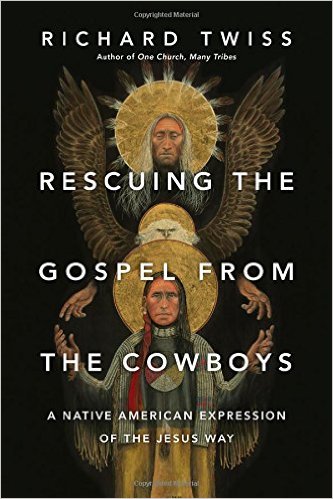Some Thoughts On, “Rescuing The Gospel From The Cowboys” by Richard Twiss.
Some Thoughts On, “Rescuing The Gospel From The Cowboys: A Native American Expression Of The Jesus Way.”
by Richard Twiss. By Kevin E. Jesmer 6-10-16

Link to book review section
Here is an excerpt from Amazon….
Missio Alliance Essential Reading List of 2015
One of Seedbed’s 10 Notable Books from 2015. The gospel of Jesus has not always been good news for Native Americans. The history of North America is marred by atrocities committed against Native peoples. Indigenous cultures were erased in the name of Christianity. As a result, to this day few Native Americans are followers of Jesus. However, despite the far-reaching effects of colonialism, some Natives have forged culturally authentic ways to follow the way of Jesus. In his final work, Richard Twiss provides a contextualized Indigenous expression of the Christian faith among the Native communities of North America. He surveys the painful, complicated history of Christian missions among Indigenous peoples and chronicles more hopeful visions of culturally contextual Native Christian faith. For Twiss, contextualization is not merely a formula or evangelistic strategy, but rather a relational process of theological and cultural reflection within a local community. Native leaders reframe the gospel narrative in light of post-colonization, reincorporating traditional practices and rituals while critiquing and correcting the assumptions of American Christian mythologies. Twiss gives voice to the stories of Native followers of Jesus, with perspectives on theology and spirituality plus concrete models for intercultural ministry. Future generations of Native followers of Jesus, and those working crossculturally with them, will be indebted to this work.
https://www.amazon.com/Rescuing-Gospel-Cowboys-American-Expression/dp/0830844236
I press my two daughters in Montreal find me books on the Aboriginal Canadian experience. My oldest daughter went to Urbana 2015 and found this book at the mission table of NAIITS (The North American Institute for Indigenous Studies). They were promoting short term missions for students among the First Nation peoples.
I was intrigued by this book because I learned so much about the contextualization movement among Native Christians. I was not really aware of that was happening in this area. I heard people being very weary of syncretism that may encroach if Christians get too into contextualizing the Gospel.
This book gives examples on how those, who contextualize the Gospel, include some Native traditional practices. There are several testimonials of people who come to follow a more contextualized version of Christianity.
I came to understand about the Indian Movement in the 1970’s and the history of how Gospel contextualization movement grrew over the last 40 years.
I also learned about two Native Christian leaders, whom I heard of three years ago, Kenny Blacksmith and Terry LeBlanc. (http://www.mypeopleinternational.com/page1/page2/page17/page11/index.html
I didn’t know the background of these two men, nor how their ministries took on their unique expression. But after reading this book it became very clear about the Gospel movement they are involved in.
I learned about the controversy within the ranks of Native ministry. It is the controversy of those who contextualize the Gospel with traditional Native ways and those who steer away from that approach. I was not aware of this controversy before. Reading this book helps me to navigate the waters.
I appreciate the scholarly approach that Richard Twiss uses in his writings. This book is like a Phd dissertation. Reading it, one gets a sense on how he and his colleagues are setting out to create a uniquely North American Native Christian Theology with which all of Christianity can be edified.
I am not yet ready to take a hard stand on Twiss’ form of contextualizing, presented in this book. I am simply an non-aboriginal observer who is sitting in the non-traditional camp. I am glad that I read the book for I am involved in networking with others involved in Native ministry. I really need to understand the whole picture. This book helps me to look at things from the 30,000 foot level.






Interact with us using Facebook